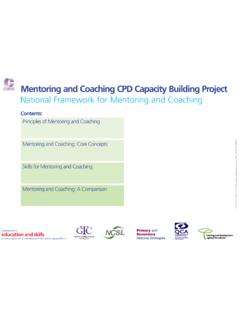Transcription of Leading Coaching in Schools - ABOUT US
1 Coaching in SchoolsLeading Practice Seminar SeriesJane Creasy and Fred Paterson National College for school LeadershipSeptember 20053 ContentsIntroduction4 ABOUT this workbook5A challenging agenda of initiatives 6 Understanding Coaching in schools9 What is Coaching ?9A National Framework for mentoring and Coaching13 What skills are needed?14 How are these skills developed?16 What does a coach do?16 Coaching is not coaches and who is coached?18 When should we use Coaching ?19 What are the benefits of Coaching ?20 Leading Coaching in schools21 What is the leader s role in promoting Coaching ?21 Creating the conditions for successful coaching21 Action implications: seven ways to build Coaching in your school22 Action implication 1: To develop a system, first develop yourself23 Action implication 2: Make sense of the whole31 Action implication 3: Create systems37 Action implication 4: Focus on principles 42 Action implication 5: Equip staff with Coaching skills49 Action implication 6: Review and reward good Coaching practice57 Action implication 7: Use and build external links and networks61 End piece64 Useful web links and further reading65 References66 Coaching seems to be everywhere at the moment.
2 Not only is itgaining a higher profile at national policy level, its use is growing inprofessional and school development. This workbook aims to helpschool leaders make sense of Coaching theory and develop approachesto Coaching in their the increasing trend for pupils to take responsibility for their own learning, it would be surprising if professionaldevelopment for the adults in Schools did not place a similar emphasis on self-direction. There is also a fast-growingappreciation of the power of effective individualised support in the form of Coaching or mentoring , and forcollaborative forms of learning. Indeed, the value placed on such learning relationships by school leaders andteachers at all stages of their careers has led to the integration of Coaching , mentoring and collaborative learningwithin many professional development programmes, from initial teacher training to headship preparation andleadership is strong evidence that Coaching promotes learning and builds capacity for change in Schools .
3 Two extensivestudies (Cordingley, Bell et al, 2003, 2005) into effective continuing professional development (CPD) point clearly to thevalue of teachers learning with and from one another. The Department for Education and Skills (DfES) recognised thatplenty of mentoring , Coaching and associated CPD was already occurring in Schools , and commissioned the Centre for the Use of Research and Evidence in Education (CUREE) to collate knowledge ABOUT the features and practice ofeffective Coaching and mentoring within educational professional development. The resulting National Framework forMentoring and Coaching provides the foundation for this workbook seeks to: set Coaching and mentoring in the context of other educational developments explore underpinning principles for the successful sustained practice of Coaching outline key elements of Coaching practice identify implications for school leaders, most notably issues around culture, behaviour and practicalities in schoolsystems, structures and processes offer working illustrations from Schools provide some challenges and practical ways forward for school leaders who wish to develop their work inembedding a Coaching culture in schoolsA range of resources associated with the workbook can be found at This workbook draws on.
4 EPPI and CUREE studies of CPD and Coaching Coaching perspectives from outside education a number of NCSL Leading Practice seminars our own accumulated experience and practice in leadership development the work of school leaders who are deeply committed to embedding Coaching practices in their schoolsPropositionsThis workbook is based on six propositions ABOUT the role of school leaders. Leaders have a moral responsibility to promote everyone s learning, both adults and pupils. Leaders have a moral imperative to develop the next generation of school leaders. High-quality Coaching in Schools supports professional development, leadership sustainability and schoolimprovement. Leaders therefore have a responsibility for providing the processes, structures and resources to support Coaching . Central to these propositions is the role of learning conversations, which make tacit knowledge explicit andengages staff in open and honest feedback.
5 Leaders should model the dialogue and personal approaches that create a culture of high-quality coachinginteractions across the this workbook6 Seven action implicationsWhat should school leaders do in response to these propositions?Not only does this workbook provide a rationale for Coaching and examples of interesting practice from schools1, italso offers structured support for leaders who wish to embed Coaching practices throughout the school . These aregrouped under seven action implications . develop a system, first develop yourself. sense of the on staff with Coaching and reward good Coaching and build external links and challenging agenda ofinitiativesRecognition of the importance of professional development has never been higher. school leaders are responding to avariety of highly significant initiatives around teaching, learning and school organisation.
6 Viewed separately, thesemight appear to create a highly complex set of agendas. However, there are common threads across thesedevelopments. We believe that school leaders who invest time in developing Coaching help staff to see thecomplementary nature of these initiatives, and so derive greater value from DfES CPD Strategy is a recognition of the importance of professional development and teacher learning inpromoting high standards of pupil learning. In common with other agencies, the DfES has sought to develop thisstrategy on the basis of strategy draws on the review by EPPI, which considered the impact of collaborative continuing professionaldevelopment on classroom practice. The review identified a range of benefits: improved learning for pupils clear focus on pupil learning increased self-efficacy: teachers felt they could make a difference increased motivation willingness to take risks deeper commitment to accessing research and evidence regularly1A number of short case studies of Schools that have worked extensively on Coaching that are referred to in this workbook are provided on the NCSL website This workbook also references case studies developed by CUREE for the DfES #K-P7 The EPPI review showed that these benefits were linked with CPD that provides.
7 Opportunities for collaboration with both peers and experts observation, feedback and shared interpretation of classroom experiences processes to encourage, extend and structure professional reflection and dialogue sustained programmes that enable teachers to embed new practices in their own context scope for teachers to identify their own starting points based own analysis of both their own and their pupils learning needsThe approaches to Coaching that we explore here are designed to exhibit all of these strategiesThe Primary National Strategy and Key Stage 3 National Strategy both have specific leadership dimensions. Bothstrategies emphasise the importance of collaborative professional development, peer support between teachers andschool leaders, and professional dialogue linked to modelling, action and review.
8 Indeed, the Key Stage 3 NationalStrategy Guide for school Leaders (DfES, 2004) stresses the importance of creating time for staff to learn together as aprinciple of school improvement, and the Primary National Strategy provides cover time for leadership teams to workand learn standards and learning-centred leadershipThe revised headteacher standards are designed to provide guidance on the expectations of headteachers and providea framework for professional learning. They place emphasis on the development of others, on building a collaborativelearning culture in the school , and on finding ways to ensure that work is focused on pupil learning and identification of ways in which school leaders impact on pupil learning has been the subject of extensive researchactivity by the National College for school Leadership (NCSL), which has resulted in two suites of materials on learning-centred leadership.
9 Research, like the work on distributed leadership and growing tomorrow s leaders, has clearly demonstrated thesignificance of leaders employing Coaching approaches and developing a culture of learning conversations to supportpupil leadership capacity: growing tomorrow s leadersThe arguments for investing in the development of others emerge from a number of different strands of NCSL work;for example, the extensive work around widely distributed leadership capacity, and the identification anddevelopment of leaders for the future2. Whether it is the realisation that leadership needs to be shared widely in thecomplex and demanding context of school leaders, or the quest to ensure that there are sufficient future leaders inthe system to secure succession when the current generation moves on, there is remarkable convergence ABOUT theimportance of Coaching .
10 2 Details of these can be found at ; ; pay and review: the work of STRBThe DfES Five Year Strategy indicates that career progression and rewards should be directly linked to those teacherswho contribute most to pupil learning, develop their own expertise and develop the practice and skill of the most recent remit for the school Teachers Review Body, the Secretary of State for Education and Skills hasindicated a desire to see Coaching and mentoring become an embedded part of professional practice, with teachersbeing self-directed in their learning, and with focused and supported observations as part of the Coaching culture. Inparallel with the developments in Coaching , teacher appraisals will become teaching and learning the school WorkforceThe overarching aim of the Transforming the school Workforce (TSW) programme is to improve the recruitment,retention, quality and status of all members of the school workforce.





